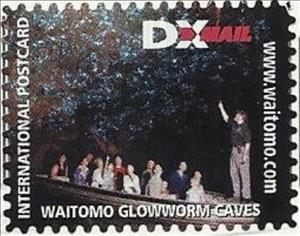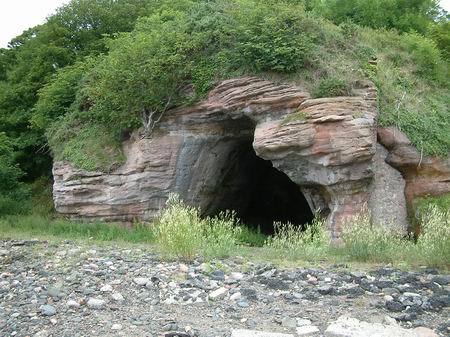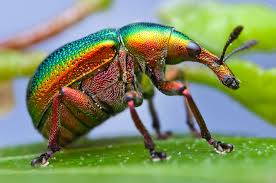Stamp: Waitomo Caves - Glow Worms (Personalized and Private Mail Stamps 2010)
Waitomo Caves - Glow Worms (Personalized and Private Mail Stamps 2010)
01 January (Personalized and Private Mail Stamps ) within release New Zealand : DX Mail goes into circulation Stamp Waitomo Caves - Glow Worms face value Int. No Face Value
| Stamp Waitomo Caves - Glow Worms in catalogues | |
|---|---|
| Colnect codes: | Col: NZ-DXM 2010-064 |
Stamp is square format.
Date not confirmedAlso in the issue New Zealand : DX Mail:
- Stamp - Beach Northland face value International;
- Stamp - Kaikoura. Coastal Road face value National;
- Stamp - Kaikoura. Crayfish face value National;
- Stamp - Kaikoura. Dolphin face value National;
- Stamp - Kaikoura. Mountain face value National;
- Stamp - Kaikoura. Sea Lion face value National;
- Stamp - Kaikoura. Sea Lion and View of Bay face value National;
- Stamp - Kaikoura. Sign and view of bay face value National;
- Stamp - Kaikoura. View of Bay face value National;
- Stamp - Kaikoura. View of Mountains across the bay face value National;
- Stamp - Kaikoura. Whale Fin face value National;
- Souvenir Sheet - Kiwi Favourites face value 10*Internationa;
- Stamp - Lambs face value International;
- Stamp - Mt Cook face value International;
- Souvenir Sheet - Natures Wonders face value 5*International;
- Stamp - Natures Wonders. All Terrain Vehicle face value International;
- Stamp - Natures Wonders. Blue Penguin face value International;
- Stamp - Natures Wonders. Juvenile Yellow Eye Penguin face value International;
- Stamp - Natures Wonders. Seal Pup face value International;
- Stamp - Natures Wonders. Yellow Eye Penguin face value International;
- Stamp - Pohutukawa face value International;
- Stamp - Hector's Dolphins face value National;
- Stamp - Lake Wanaka face value National;
- Stamp - Mitre Peak face value National;
- Stamp - Native Rainforest face value National;
- Stamp - Pohutu Geyser face value National;
- Stamp - Auckland Harbour face value Int.;
- Booklet - Auckland Harbour and Landscapes Booklet face value 5*Int.;
- Stamp - Auckland Museum face value Int.;
- Stamp - Classique Paihia - Paihia Township from Air face value Int.;
- Stamp - Fern Frond face value Int.;
- Stamp - Fern Frond face value Int.;
- Stamp - Ferns in Forest face value Int.;
- Stamp - Ferns in Forest face value Int.;
- Booklet Pane - Kauri and Native Flora Series Booklet face value Int.;
- Stamp - Kauri Tree face value Int.;
- Stamp - Kauri Tree face value Int.;
- Stamp - Kea face value International;
- Stamp - Kea face value International;
- Booklet - Kea and Native Birds Booklet face value 5*International;
- Stamp - Kingfisher face value International;
- Stamp - Kiwi face value International;
- Stamp - Lake Heron face value Int.;
- Stamp - Lake Matheson face value Int.;
- Stamp - Lake Matheson face value Int.;
- Stamp - Lake Taylor - Day face value Int.;
- Stamp - Lake Taylor - Dusk face value Int.;
- Booklet - Lake Wakatipu and Queenstown Series Booklet face value 5*Int.;
- Stamp - Lambs face value International;
- Stamp - Lambs face value Int.;
- Stamp - Mitre Peak face value International;
- Stamp - Mitre Peak face value International;
- Booklet - Mitre Peak Series Booklet face value 5*International;
- Booklet - Moeraki Boulders Gift Shop face value 5*Int.;
- Stamp - Mount Cook face value International;
- Stamp - Mount Cook face value Int.;
- Stamp - Mount Cook face value International;
- Stamp - Mount Ruapehi Erupting face value International;
- Stamp - Mount Taranaki face value International;
- Stamp - Muriwai Beach face value Int.;
- Stamp - Natural New Zealand - Kiwi face value Int.;
- Stamp - Natural New Zealand - Native Rainforest face value Int.;
- Stamp - Natural New Zealand - Native Rainforest face value Int.;
- Stamp - Natural New Zealand - Pohutukawa face value Int.;
- Stamp - Natural New Zealand - Pohutukawa face value Int.;
- Stamp - Natural New Zealand - Sheep Farming face value Int.;
- Stamp - Natural New Zealand - Sheep Farming face value Int.;
- Stamp - Natural New Zealand - Sheep Mustering face value Int.;
- Stamp - Natural New Zealand - Sheep Mustering face value Int.;
- Stamp - Origins of Aotearoa - Huka Falls face value Int.;
- Stamp - Origins of Aotearoa - Maori Warrior face value Int.;
- Stamp - Origins of Aotearoa - Mud Pool face value Int.;
- Stamp - Origins of Aotearoa - Pohutu Geyser face value Int.;
- Stamp - Origins of Aotearoa - Tongariro National Park face value Int.;
- Booklet Pane - Origins of Aotearoa Booklet face value 5*Int.;
- Stamp - Otago Highlights - Dunedin Octagon face value Int.;
- Stamp - Otago Highlights - Royal Albatross face value Int.;
- Stamp - Otago Highlights - Taieri Gorge Railway face value Int.;
- Stamp - Otago Highlights - University of Otago face value Int.;
- Stamp - Otago Highlights - Yellow Eyed Penguin face value Int.;
- Stamp - Paihia - Bay of Islands face value Int.;
- Stamp - Paihia - Cape Reinga Lighthouse face value Int.;
- Stamp - Paihia - Hole in the Rock face value Int.;
- Stamp - Paihia - Kiwi face value Int.;
- Stamp - Paihia - Paihia Township from Air face value Int.;
- Stamp - Pohutukawa face value International;
- Stamp - Pohutukawa face value Int.;
- Stamp - Portals to the Sea - Hectors Dolphins face value Int.;
- Stamp - Portals to the Sea - NZ Fur Seal Pup face value Int.;
- Stamp - Portals to the Sea - Sperm Whale face value Int.;
- Stamp - Portals to the Sea - Yellow Eyed Penguin face value Int.;
- Stamp - Queenstown - City View With Lake face value Int.;
- Stamp - Queenstown - Lake Wakatipu face value Int.;
- Stamp - Queenstown - Lake Wakatipu and "The Remarkables" face value Int.;
- Stamp - Queenstown - Lake Wakatipu and Queenstown face value Int.;
- Stamp - Rotorua - Cable Car face value Int.;
- Stamp - Rotorua - Haka face value Int.;
- Stamp - Rotorua - Luge face value Int.;
- Stamp - Rotorua - Mud Pool face value Int.;
- Stamp - Rotorua - Old Post Office face value Int.;
- Stamp - Rotorua Museum face value Int.;
- Stamp - Scenic Queenstown - Bowen Falls face value Int.;
- Stamp - Scenic Queenstown - Mitre Peak face value Int.;
- Stamp - Scenic Queenstown - Queenstown face value Int.;
- Stamp - Scenic Queenstown - Queenstown Gondola face value Int.;
- Stamp - Shaped Paua Shell face value Int.;
- Stamp - Shaped Sheep face value Int.;
- Stamp - Shaped Silver Fern face value Int.;
- Stamp - Shaped Tiki face value Int.;
- Stamp - Shark face value Int.;
- Stamp - Sky Tower face value Int.;
- Stamp - Sky Tower face value Int.;
- Booklet Pane - South Island Lakes Series Booklet face value Int.;
- Stamp - Tui face value International;
- Stamp - Uretiti Beach face value International;
- Stamp - Uretiti Beach face value Int.;
- Stamp - Waitomo Caves - Boat in Caves face value Int.;
- Stamp - Waitomo Caves - Glow Worms face value Int.;
- Stamp - Waitomo Caves - Kiosk face value Int.;
- Stamp - Waitomo Caves - Rock Formation face value Int.;
- Stamp - Waitomo Caves - Stalactites face value Int.;
- Stamp - West Coast Wonderland - Fox Glacier face value Int.;
- Stamp - West Coast Wonderland - Franz Josef Glacier face value Int.;
- Stamp - West Coast Wonderland - Lake Matheson face value Int.;
- Stamp - West Coast Wonderland - Lake Wanaka face value Int.;
- Stamp - West Coast Wonderland - Mount Cook, Lake Pukaki face value Int.;
|
Data entry completed
50%
|
|
|---|---|
| Stamp Waitomo Caves - Glow Worms in digits | |
| Country: | Personalized and Private Mail Stamps |
| Date: | 2010-01-01 |
| Emission: | Private |
| Format: | Stamp |
| Face Value: | Int. No Face Value |
Stamp Waitomo Caves - Glow Worms it reflects the thematic directions:
A cave or cavern is a natural void in the ground, specifically a space large enough for a human to enter. Caves often form by the weathering of rock and often extend deep underground. The word cave can refer to smaller openings such as sea caves, rock shelters, and grottos, that extend a relatively short distance into the rock and they are called exogene caves. Caves which extend further underground than the opening is wide are called endogene caves
Insects (from Latin insectum, a calque of Greek ἔντομον [éntomon], "cut into sections") are a class (Insecta) of hexapod invertebrates within the arthropod phylum that have a chitinous exoskeleton, a three-part body (head, thorax and abdomen), three pairs of jointed legs, compound eyes and one pair of antennae. They are the most diverse group of animals on the planet, including more than a million described species and representing more than half of all known living organisms. The number of extant species is estimated at between six and ten million, and potentially represent over 90% of the differing animal life forms on Earth. Insects may be found in nearly all environments, although only a small number of species reside in the oceans, a habitat dominated by another arthropod group, crustaceans. The life cycles of insects vary but most hatch from eggs. Insect growth is constrained by the inelastic exoskeleton and development involves a series of molts. The immature stages can differ from the adults in structure, habit and habitat, and can include a passive pupal stage in those groups that undergo 4-stage metamorphosis (see holometabolism). Insects that undergo 3-stage metamorphosis lack a pupal stage and adults develop through a series of nymphal stages. The higher level relationship of the Hexapoda is unclear. Fossilized insects of enormous size have been found from the Paleozoic Era, including giant dragonflies with wingspans of 55 to 70 cm (22–28 in). The most diverse insect groups appear to have coevolved with flowerin plants.
Tourism is travel for pleasure or business; also the theory and practice of touring, the business of attracting, accommodating, and entertaining tourists, and the business of operating tours. Tourism may be international, or within the traveller's country. The World Tourism Organization defines tourism more generally, in terms which go "beyond the common perception of tourism as being limited to holiday activity only", as people "traveling to and staying in places outside their usual environment for not more than one consecutive year for leisure, business and other purposes". Tourism can be domestic or international, and international tourism has both incoming and outgoing implications on a country's balance of payments. Today, tourism is a major source of income for many countries, and affects the economy of both the source and host countries, in some cases being of vital importance.



